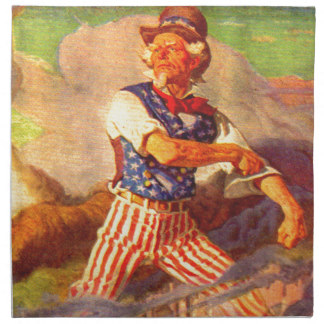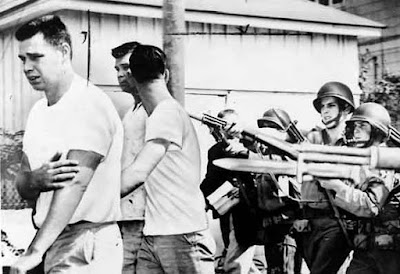The forsaken

Sorry, folks, one more sentimental, overwrought, non-economics-related post. I promise I'll try my best not to turn this from an econ blog into a sentimental, sappy blog about nationalism and culture and stuff like that. But anyway, I just had to do a follow-up to my last post.
In my last post, I wrote about what I see as the fundamental core of the United States as a nation - the concept of equality. Ta-Nehisi Coates, in a much longer, more personal, and better-written essay than mine, expresses a very different vision of what America is all about. I encourage you to read his piece from start to finish (don't skim).
Here are just a couple small excerpts (again, you should read the whole piece):
To be black in the Baltimore of my youth was to be naked before the elements of the world, before all the guns, fists, knives, crack, rape, and disease. The law did not protect us. And now, in your time, the law has become an excuse for stopping and frisking you, which is to say, for furthering the assault on your body. But a society that protects some people through a safety net of schools, government-backed home loans, and ancestral wealth but can only protect you with the club of criminal justice has either failed at enforcing its good intentions or has succeeded at something much darker...
Before I could escape [the ghetto], I had to survive, and this could only mean a clash with the streets, by which I mean not just physical blocks, nor simply the people packed into them, but the array of lethal puzzles and strange perils which seem to rise up from the asphalt itself. The streets transform every ordinary day into a series of trick questions, and every incorrect answer risks a beat-down, a shooting, or a pregnancy. No one survives unscathed. When I was your age, fully one-third of my brain was concerned with who I was walking to school with, our precise number, the manner of our walk, the number of times I smiled, who or what I smiled at, who offered a pound and who did not—all of which is to say that I practiced the culture of the streets, a culture concerned chiefly with securing the body...
This America that Coates sees is very real. How can his America be the same America that I believe in so strongly?
Let me try to explain. I am not as eloquent as Coates, so I'll use my typical plain-spoken, spluttering style, with visual aids.
Because I grew up Jewish, my parents made me read about the Holocaust at a very young age. I read the testimonials, I saw the pictures. It really freaked me out. I was scared. I remember walking down the street with my dad at the age of 7, and asking him: "Is there anyone like the Nazis around today?" He said "Well, the Soviet Union is a little like the Nazis." That scared me. "What if the Soviet Union comes to get us?", I asked. And his answer was: "We have the most powerful military in the world. And we have tens of thousands of nuclear weapons. There's no way they can get us."
And that was it. Suddenly I felt safe from those cosmic threats, those vast and distant hosts of evil. I had the ultimate backup.
I had this on my side:

I may be too weak to defend myself against an army of bad guys, but behind me stands what you see in the picture above. That is a picture of America coming to protect the weak and forsaken. That is a picture of the ultimate backup.
What about black Americans? Do they have that same backup? Well, they used to, at least once in a while. In the Civil War they did. And in the Civil Rights era they did. Check out this:

That's what I'm talkin' about!! That is the 101st Airborne Division - the same guys from D-Day! - protecting some black kids from assholes who want to stop them from going to school. And the guy who ordered them to do it was the same guy from D-Day - Dwight D. Eisenhower! And how about when the assholes tried to stop the black kids from going to school? This!
But here's the thing - this only happens once in a while. Most of the time, large chunks of black America - not the whole thing, not all African-Americans, but vast swathes - are either left to rot in the anarchy Coates describes, or actively oppressed by police, courts, and prisons.
Don't believe me? What's this, then?
WHAT THE F******************* IS THAT S***?!!!
Or this?!!!

These are peaceful protesters being menaced by militarized police!! These are not racist individuals making personal choices to be mean to black people! This is an institutional, organized, official act of government oppression of a peaceful American populace! Where's the 101st Airborne when you need them???!!
It's not just black people who get this treatment these days, of course - I saw the same scene at anti-Iraq War protests in 2003. But for a lot of black Americans, this is their only contact with the police, with the armed might of America, except for getting arrested and thrown in hellish prisons.
We lock up millions of people in this nation - far more even than authoritarian nations like China and Russia. It's our own Gulag Archipelago. In these prisons most inmates are raped and beaten. All of them are forced to do slave labor. After they are released, they can never vote in American elections again. And they have extreme trouble ever finding jobs again. They are, in short, tortured, enslaved, and then reduced to permanent second-class citizens.
Black Americans are far more vulnerable to this bullshit than other Americans. Racial profiling means they are far more likely to get arrested (and are killed by police at much higher rates). Racist sentencing means they are far more likely to be given prison terms, and longer ones. And the militarized response of police to protests in Ferguson and Baltimore makes it clear to black communities that America is not on their side - that the police are not simply trying to protect poor black communities from a few bad apples, but simply trying to suppress and contain poor black communities and keep them cordoned off from the rest of America.
This is exactly what Coates talks about in his essay. It's real. It's true. You can see it on YouTube.
For white Americans, there is at least the idea that this is temporary, that America will correct these abuses, right the wrongs, and return to the correct path. For Asian or Hispanic Americans, there is probably less certainty (remember those internment camps?), but still an overall feeling of positivity. But when black Americans look back on American history, what do they see? Centuries of racial enslavement. Another century of lynchings, segregation, and KKK terrorism. And essentially zero lag between the end of segregation and the beginning of the prison gulags.
For me, growing up, America represented the ultimate backup, the ultimate protector. Many black Americans - not all, of course, but many - feel utterly forsaken by that protector. They are lost, abandoned in a violent, frightening world, with no backup, no sheltering presence, no cavalry to ride to the rescue when the chips are down. Maybe just cavalry to ride over your face.
To me this unacceptable. Unacceptable! Those are our people - our countrymen! America should be the protector of the weak, not the oppressor - and when the weak are Americans themselves, the imperative is a million times stronger! No American should ever feel forsaken by the powers that be. No American should ever feel that the system is against him or her.
To me the plight of American black people is not about justice. It's not about righting the wrongs of history. It's about giving black Americans the certainty that America is a country that is always - ALWAYS - on their side, that will always fight for them, not against them. It's about backup.
I'm a nationalist. I firmly believe that the fundamental essence of America is the belief in human equality and freedom, and that this essence will continue to win out over the darker tendencies that afflict our nation and all nations. But this essence is not a magical force that rights all wrongs while we sit on our couches and scarf Doritos and Mountain Dew. My relatives weren't in the D-Day picture above, but they were in the overall effort, flying planes or fighting in Asia or doing cryptography. The army of backup doesn't exist unless a bunch of us join up and volunteer.
And to our credit, lots of us are joining up and volunteering. The protests after the killing of Eric Garner were enormous. But we need more than protesters - we need police departments, judges, and legislators to use their power to stop the madness. Stop the police militarization, stop the racial profiling, stop the racist sentencing, and stop mass incarceration.
If we can save France from Hitler, if we can save China from the Japanese Empire, if we can save Europe from the Soviet Union, we can save our own people from our own system.

